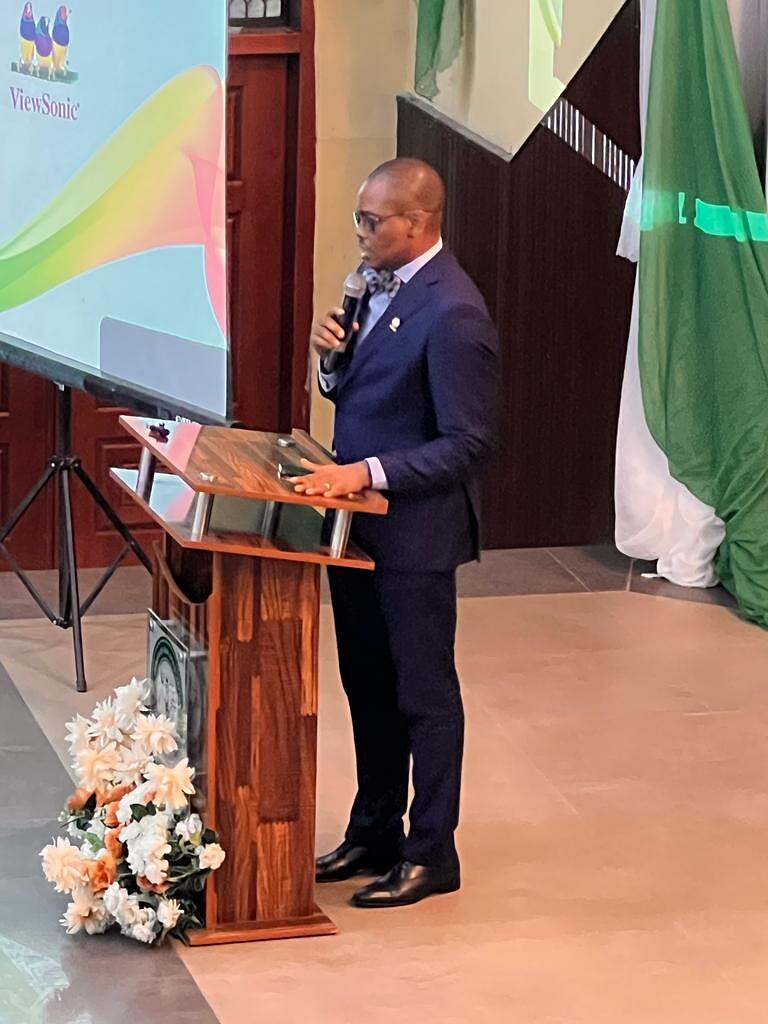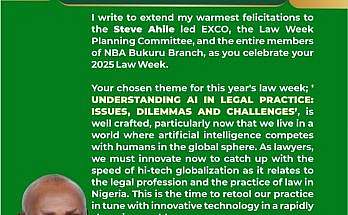Harnessing The Potential Of Digital Economy; The Place of Young Lawyers Being A paper presented •BY Mazi Afam Osigwe, SAN at the occasion of the median NBA Ile-Ife Branch’s YLF Summit on 22-06-2023.
Good day esteemed Colleagues. Special regards to the Chairman, members of the executive council and organizers of this august event. I am particularly honored and delighted being in your midst to commemorate this occasion.
I was asked to speak on the topic Harnessing the potentials of digital economy; the place of young lawyers. As you may already have discerned, there is no platform more befitting for a discourse bordering on a topic of this nature than this.
1. Change is one inevitable concept in the world we inhabit. The evolutionary biologist, Charles Darwin is reported to have said that “it is not the strongest of the species that survives, nor the most intelligent that survives. It is the one that is most adaptable to change.” The quote emphasizes the necessity for a disposition towards adaptation and adjustment as supervening circumstances may require for survival.
It thus becomes necessary that a requisite level of attention be paid to remain abreast with the changing circumstances one may find his/her self. Our world is in a constant brawl between the old guard and young blood, and most often, the young blood prevails because anyone who would not ride with the changing tides would most probably be consumed by it. One of such changes is ably embodied in a concept now popularly known as the ‘digital economy’
 I would like for the purpose of this talk, contrast the digital economy with what I would want to call the “analog economy.”
I would like for the purpose of this talk, contrast the digital economy with what I would want to call the “analog economy.”Analog economy, as distinguished from the digital economy, entails the old and largely phased out ways of conducting business which involves a physical flow and circulation of information such as physical meetings, analog phone calls, faxing, etc. Digital economy, on the other hand, information is largely digital and mostly automated. In a sense, the digital economy can alternatively be called the ‘connected economy.’ Some would also wish to refer to it as the ‘knowledge economy.’
The tipping point, though, of the digital economy is that technology has now greatly and easily facilitated connectivity for fostering business relations.
Fintech has evolved from merely being backend systems used by established banking institutions to varying endeavors such as online payments, fund raising, money tracing, investment management, etc.
That is no longer the case, as an investor in Nigeria could buy or sell stocks, options or even bonds in New York, London or Tokyo at split seconds without having to be present at these distant places.
The new economy makes it possible for gain access to news of market fluctuations in real time, as well as sophisticated software for analyzing and predicting possible market swings which in turn influence when trades are to be entered or exited. These are possible only because of the digital marketplace infrastructure made possible under the new economy.
Another crucial feature of fintech under the new economy is the blockchain technology.
In lay terms, blockchain is a new method of storing data in such a way that makes it difficult to arbitrarily update, hack or interfere with the information as stored therein.
It is sort of a digital ledger that keeps records of multi-level sophisticated transactions which could be replicated and distributed across the blockchain’s entire network of computer systems.
Let’s say Messrs A, B, C & D live across four continents of the earth, and they have pulled resources together for the development of a project in Amsterdam, rather than bugging each other to provide accountability for each other’s commitment in the endeavor, they could simply create a network whereby every transaction, reaction and progress made is automatically recorded viewed in real time.
And the information fed to the network cannot easily be altered by alien parties.
The technology is, of course, more sophisticated than I just described, but it gives a fair idea of the concept. The blockchain technology as a platform also hosts what is called a ‘smart contract’. Smart contracts are codes written into a blockchain that executes the terms of an agreement or contract from outside the chain.
It automates the actions that would otherwise be completed by the parties in the agreement, which removes the need to place undue reliance on the honor of the contacting parties to fulfill their end of the contract.
With such platforms in place, trust – a vital ingredient in fostering economic relations – is promoted and upheld. And even better, business could take place in the absence of trust, as the processes become more or less automated.
4. The blockchain technology platform also facilitates transactions in digital currencies (popularly known as cryptocurrencies). Cryptocurrencies have, in recent years,enjoyed increasing recognition, adaptation and usage. The underlying idea being that money is stored in a digital form, and as such has all the basic characteristics of hard currency, only that it is rendered in a digital form.
If there is no connection to start with there would be no coming together to facilitate business for which punctuality becomes a necessity. Connectivity is another major area wherein the digital economy has wrought massive revolution. Ride hailing enterprises such a bolt, Uber, Taxify; Retail outlets such as Amazon, Alibaba, Jumia, Konga and several other business endeavors of that nature are only possible because of the connectivity engendered under the digital economy.
For such endeavors, parties to transactions under them need not meet each other or even know themselves, but commercial transactions are carried out seamlessly notwithstanding.
It goes without saying at this point that the digital economy is aggressively phasing the old economy out. Those who insist on latching on to the old order would find that in a not so long time from now, they would no longer be relevant or would probably have completely lost touch with current economic realities.
This much more so now because the digital economy, in addition to phasing the old order out, brings in its wake unimaginable opportunities which would greatly reward early adapters and those properly positioned to make the most of what it comes with.
Testimonies abound to this end. We see the unprecedented records set by Nigerian start-ups like Flutterwave, Paystack, Andela and the likes. These establishments effectively rode the wave of the digital economy and are reaping the benefits thereof. This goes to show that vast benefits and opportunities abound for individuals and societies that decide to opt for the new ways of organizing the economy.
6. The raging effects of the digital economy is as well present in the legal profession. The legal profession is largely a service-based economy, one in which connectivity plays a key role in arriving at any chance of success.
By virtue of the greater and more efficient connectivity, the world has become a global village. The untold consequence of this as regarding the legal profession could be that international legal frameworks regulating e-business and e-commerce would run alongside sovereign laws governing commerce and enterprise in specific countries in ordering economic activities.
Trade frameworks such as the African Continental Free Trade Agreement (AfCFTA), the North American Free Trade Agreement (NAFTA), various European Free Trade Agreements, to mention but a few have now come to hold sway over international trade and commerce, and mostly facilitated by the digital economy infrastructure.
As years run by, however, it appears that these laws tend to assume similar outlooks when it comes to regulating international commerce. This phenomenoncould also fit in as an effect of the digital economy on international legal practice.

7. As regulatory efforts tend to become uniform as time passes by, the market place is as well becoming centralized. In this sense, your next-door neighbor is not your only competitor.
The lawyer in Wellington or Doha pulls as much competition as the one in Lagos.
It then means that failure to harness the novelties provided by the digital economic may as well have terminal effects, because where the demands of clients seeking your professional services are not met with the requisite dexterity and sophistication, such clients may have to carry their businesses somewhere else. And that somewhere else would probably mean your competitor in Kampala.
It is usually the case that revolutionary ideas are usually birthed and easily adopted by younger members of the community.
The younger members of any society largely represent the future of that society. The buck then falls on the younger generation to adopt and adapt with the novel ways business is conducted or services are rendered. Such novelties are quietly and quickly becoming encompassing, as virtually every area of legal practice is now being affected by the digital economy revolution.
Areas such as regulatory compliance, international commerce, shipping and maritime law, intellectual property law, data privacy, telecommunication, energy, competition laws and so many others have felt the impact of the digital economy.
These and so many other areas offer prospects for prosperity and good success for young and energetic lawyers passionate and persistent enough to drive the innovations and novelties being introduced under the digital economy.
8. I must point out that in recent times, it appears there’s been insinuations that the legal profession is quickly becoming saturated, and this in turn is causing a lot of young lawyers assume a cynical disposition towards the profession.
To young lawyers who are beginning to think this way, I’ll refer them to Sen. Enyinna Abaribe’s memoir ‘Made in Aba’, where a young and aspiring politician approached him expressing unease that the political field has become overcrowded and that there was no space for him to operate. He told the young person that if one gets to a dance floor in a party, he shouldn’t say he would not dance because the dance floor is over-crowded.
Rather, he should pick a corner of the floor and join the dance, and in not so long a time, those who started dancing earlier would get tired and leave the floor, and before long there’ll be room enough to operate.
Young lawyers should have this anecdote in mind as you strive in perseverance to make your mark in this profession.
The old guard would always give way for the young blood, just as the old ways of doing things would have to cede way for contemporary methodology.
9. As I conclude, however, I must bring to bear the biblical admonition not to remove the ancient landmark which your forebearers have set.
As much as we welcome development and novelty in its different shades and forms, we must be careful not to stray too far from our underlying principles.
For all its worth, the novelties are mostly new ways of doing the old things. Be careful not to get carried too far away in a bid to ride the new waves of innovation.
Thanks so much for your audience.




